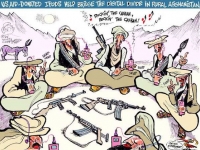Pink "iPods" for Democracy!

The employees of Voice for Humanity, in a fever of righteous idealism, traveled six hours on donkeys and horses through the remotest parts of the Afghanistan countryside. They were on a mission: to deliver what they thought was an invaluable literacy tool for Afghans. Pink for women, silver for men.
They were custom digital audio players which function like the trendy iPod although they look more like generic radios or MP3 players. They are made in China and filled with public service messages on topics including human rights, women's rights, Afghanistan's election process, and health.
The aid workers distributed 65,800 recorders, which cost $50 each, to remote villages and some of the most dangerous and volatile areas in the country. The staff of Voice for Humanity, a non-profit humanitarian aid agency that claims to be dedicated to developing literacy in the world, says it has trained tribal chiefs and other community leaders to listen to the recorders and then pass them on to individuals and families.
The pseudo-iPods were funded by a group of U.S. government funders that included the United States Agency for International Development (USAID). An $8.3 million contract was awarded to Kentucky-based Voice for Humanity, a small group run by two Lexington businessmen, to use its audio players to "promote democracy" in advance of the 2004 Afghan presidential election as well as to similar projects in Nigeria
How VFH got the contract is a matter raising some skeptical eyebrows in the aid community. When the two founders needed to sell their idea to the federal government, they turned to a lobbying group run by Hunter Bates, the former chief of staff to Senator Mitch McConnell. McConnell, it turns out, chairs the senate subcommittee that controls the money allocated to USAID.
Critics say it was those connections that resulted in millions of taxpayer dollars going to an ineffective and laughable program of throwing trendy technology at serious international issues.
"It shows how foolhardy people can be when they're not thinking practically," said Patricia Omidian, an aid worker heading the American Friends Service Committee.
Several former employees of Rendon in Afghanistan initially agreed to speak about the company's activities but quickly changed their minds, claiming unconvincingly that they didn't have time. The sudden clam-up coincided with very public press reports about bogus news reports painting the American war in Iraq in a favorable light that had been planted by Lincoln Group operatives in the Arab press. Pentagon documents show that Lincoln paid Iraqi newspapers to run the articles. |
There are further questions about the propriety of the US government distributing "public service messages" about an election in which it openly backs one candidate over the others. VHF has gone to great lengths to ensure that the recorders "have no US footprint," despite the fact they are funded by the U.S. government and distributed by an American NGO.
Assuming that the content of the recorded audio on the players was purely educational and did have value as a literacy tool, it would have been cheaper and more affective to provide these communities with radio transmitters, which cost about $500 total. Radio programming would have reached more people, and is already how most Afghans get their information. Further, the information could be updated on the fly, whereas the VFH recorders must be rounded up and fitted with new chips bearing new material, and then redistributed. Each new chip costs $10, plus the cost of labor and travel.
¨Why not radios?¨ said one aid worker critical of the deal. "You see this time and time again to what (the politicians) think makes political sense regardless of feasibility or viability."
Yet Pete McLain, director of Voice for Humanity, said that Afghan focus groups and surveys have shown that the recorder has educated the public about pertinent material they had no access to before.
¨Some of the work can be done with the radio. We're different because of the depth and the fact that it can be repeated whenever you want it, like in the kitchen, in the field. There's an ability to listen to it as a group and rewind it. Radio is good for soundbites," McLain said. "This is about training. We don't want to compete with radio. It's apples and oranges. This is supplemental. We see some synergy."
VFH has hired Altai Consulting to audit the project for efficiency and effectiveness. Its results will be presented to USAID to bolster VFH's claim that the program is successful.
In Kabul, VFH's staff of 40 is entirely Afghan. The supervisor, Abdul Wakil, is a firm believer in the product and its utility. He recalled a case where the device was played at a wedding in front of 500 women in Logar province. The program included information on women's right to vote, including instructions on how to go about it. Although the women had been warned by traditionalists not to vote, many of them had the courage of conviction to register upon hearing the messages, Wakil said.
"It's a school for them," he added.
The Women's Affairs Directorate in Logar confirmed that the players had provided beneficial information before the election, but that it was an impractical means of educating their communities. At their offices, a child could be seen playing with one of the audio players, switching the buttons like it was a toy.
In Khoshi, one of the districts in Logar where the player was distributed before elections, men in shops said they had listened to the material on the tape and gained some insight into the election process but afterwards, the digital device became a toy for their children.
The color-coded idea for the players emerged when VFH learned that men had taken the devices from women and were using them for themselves. Then the Ministry of Women's Affairs suggested changing the color of some of the silver recorders to pink so that men would be too embarrassed to carry them around. So VHF ordered more players, this time in pink.
Wakil sat in his guesthouse in his pressed black suit showing me the recorder's features. It's a set with a solar charger and a hand crank. The programming now includes informational dispatches and dramatic performances read in the Afghan languages of Dari and Pushto.
Wakil said VFH is now lobbying to receive more grants so that it can continue making new chips with additional information on health, counter narcotics and children and eventually, build a library of data.
But many at USAID aren't buying it. "We had to play it politically so we gave them some money. But they could not leverage us to give them too much," said another USAID source.
- 174 War & Disaster Profiteers Campaign



